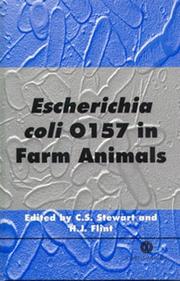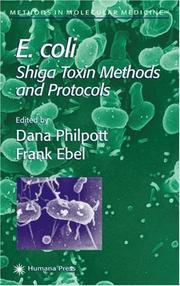| Listing 1 - 9 of 9 |
Sort by
|
Book
Year: 2009 Publisher: Fort Collins, CO : U.S. Dept. of Agriculture, Animal and Plant Health Inspection Service, Veterinary Services, Centers for Epidemiology and Animal Health,
Abstract | Keywords | Export | Availability | Bookmark
 Loading...
Loading...Choose an application
- Reference Manager
- EndNote
- RefWorks (Direct export to RefWorks)
Book
Year: 1974 Publisher: Edinburgh Churchill Livingstone
Abstract | Keywords | Export | Availability | Bookmark
 Loading...
Loading...Choose an application
- Reference Manager
- EndNote
- RefWorks (Direct export to RefWorks)
Book
Year: 2007 Publisher: Washington, D.C. : U.S. Dept. of Agriculture, Economic Research Service,
Abstract | Keywords | Export | Availability | Bookmark
 Loading...
Loading...Choose an application
- Reference Manager
- EndNote
- RefWorks (Direct export to RefWorks)
Escherichia coli infections --- Foodborne diseases. --- Economic aspects
Book
Year: 2002 Publisher: Atlanta, Ga. : U.S. Dept. of Health and Human Services, Public Health Service, Centers for Disease Control and Prevention, National Center for Infectious Diseases, Epidemiology Program Office, Public Health Practice Program Office,
Abstract | Keywords | Export | Availability | Bookmark
 Loading...
Loading...Choose an application
- Reference Manager
- EndNote
- RefWorks (Direct export to RefWorks)
Escherichia coli infections --- Foodborne diseases --- Epidemiology
Book
Year: 2012 Publisher: [Fort Collins, Colo.] : APHIS Veterinary Services, Centers for Epidemiology and Animal Health,
Abstract | Keywords | Export | Availability | Bookmark
 Loading...
Loading...Choose an application
- Reference Manager
- EndNote
- RefWorks (Direct export to RefWorks)
Chickens --- Escherichia coli infections in animals --- Diseases
Book
Year: 2009 Publisher: Washington : U.S. G.P.O.,
Abstract | Keywords | Export | Availability | Bookmark
 Loading...
Loading...Choose an application
- Reference Manager
- EndNote
- RefWorks (Direct export to RefWorks)
Meat --- Meat inspection --- Escherichia coli infections in animals --- Contamination

Abstract | Keywords | Export | Availability | Bookmark
 Loading...
Loading...Choose an application
- Reference Manager
- EndNote
- RefWorks (Direct export to RefWorks)
Escherichia coli O157:H7. --- Escherichia coli infections in animals. --- Escherichia coli infections. --- Escherichia coli infections --- Escherichia coli infections in animals --- Escherichia coli O157:H7 --- EHEC (Bacterium) --- Enterohemorrhagic Escherichia coli --- Escherichia coli O157 --- Escherichia coli --- Bacterial diseases in animals --- Veterinary gastroenterology --- Colibacillosis --- Gram-negative bacterial infections --- ESCHERICHIA COLI O157 --- ESCHERICHIA COLI INFECTIONS --- CATTLE --- CATTLE DISEASES --- STOMACH, RUMINANT --- ABATTOIRS --- GENETICS --- PATHOGENICITY --- VETERINARY
Book
Year: 2012 Publisher: [Washington, D.C.] : U.S. Govt. Accountability Office,
Abstract | Keywords | Export | Availability | Bookmark
 Loading...
Loading...Choose an application
- Reference Manager
- EndNote
- RefWorks (Direct export to RefWorks)
Food --- Escherichia coli infections --- Cattle --- Safety measures. --- Prevention. --- Safety measures --- Government policy

ISBN: 0896039390 9786610843169 1280843160 159259316X 9780896039391 Year: 2003 Volume: 73 Publisher: Totowa, NJ : Humana Press : Imprint: Humana,
Abstract | Keywords | Export | Availability | Bookmark
 Loading...
Loading...Choose an application
- Reference Manager
- EndNote
- RefWorks (Direct export to RefWorks)
Shiga toxin-producing Escherichia coli (STEC) and its isolated cytotoxin (Stx), also known as "hamburger E. coli" are continuing sources of significant-and sometime fatal-human and animal infections. In E. coli: Shiga Toxin Methods and Protocols, a multidisciplinary panel of leading experimentalists details the key protocols for the diagnosis and study of STEC and Stx pathogenesis. Described in step-by-step detail, these readily reproducible techniques range from those for the diagnosis and detection of STEC bacteria in patient and animal samples, to those for studying the cellular microbiology of STEC infections, especially host-pathogen interactions and the hemolysin of STEC. There are also protocols for studying the details of Shiga toxin (Stx) biology-from the purification of the toxin to the effects of Stx on various host cell functions-and for exploring STEC-mediated disease in various animal models. Each protocol has been thoroughly tested and optimized to produce robust and successful experimental results, and includes troubleshooting tips, advice on avoiding pitfalls, and alternate methods. Comprehensive and up-to-date, E. coli: Shiga Toxin Methods and Protocols offers bacteriologists and medical microbiologists today's most powerful tools for illuminating the molecular and cellular microbiology of STEC's bacterial pathogenesis, as well as the mechanisms of its toxicity.
Escherichia coli infections --- Verocytotoxins --- Escherichia coli Infections --- Shiga Toxin --- pathology --- analysis --- Shiga-like toxins --- SLT (Bacterial toxin) --- VT (Bacterial toxin) --- Colibacillosis --- Enterotoxins --- Gram-negative bacterial infections --- Microbiology. --- Microbial biology --- Biology --- Microorganisms
| Listing 1 - 9 of 9 |
Sort by
|

 Search
Search Feedback
Feedback About UniCat
About UniCat  Help
Help News
News